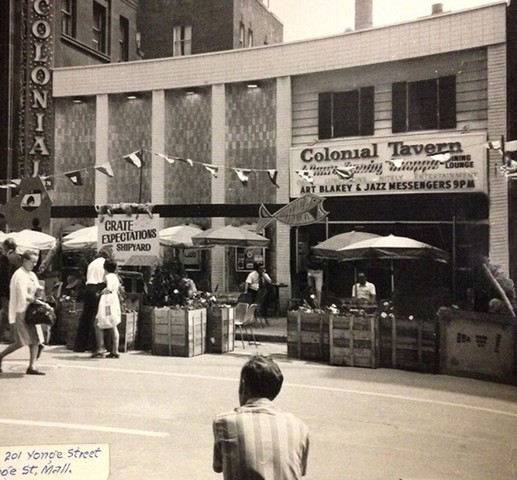
The Heart of Music City: The Colonial
The Colonial Tavern
Colonial Tavern, 201 Yonge Street during 1973 Yonge Street Mall. City of Toronto Archives, Fonds 1118, Series 377, Item 782.
Cy McLean and his Rhythm Rompers perform at The Colonial Tavern, Toronto, 1947. Clara Thomas Archives and Special Collections, York University Libraries, Toronto, Ontario. Archie Alleyne Collection.
Toronto Star advertisement for Cy McLean and his Rhythm Rompers at the Colonial. Toronto Star, April 22, 1947.
Toronto’s top brass jazz spot
Music could be heard as soon as the Colonial Tavern opened its doors in 1947. But, despite its growing reputation for great live jazz, audiences often grumbled about the venue’s poor layout. “There were no good tables at the Colonial, only less bad tables,” journalist Robert Fulford once complained. But the high caliber of acts kept the seats full: over the years, the Colonial featured Chet Baker, Dave Brubeck, Dizzy Gillespie, and Sarah Vaughn.
Regulations for bars and taverns like the Colonial required that food be served alongside any alcoholic beverage. Adhering to the letter of the law, the Colonial offered three items on its menu: an open-face sandwich, a cheese plate, or a dish of celery and olives. The last was the most popular choice for jazz fans at the Colonial as it was also the cheapest, costing only $1.50.
Cy McLean and his Rhythm Rompers
In 1947, the Tavern hired Cy McLean and his band, the Rhythm Rompers, to play the latest dance floor hits. Cy McLean was one of the few Black musicians playing Yonge Street clubs and restaurants in the 1940s. Union regulations required venues to only hire musicians who were members of the Toronto Musicians’ Association. McLean became the Association’s first Black member in 1944, paving the way for other Black musicians to gain membership and work as professional musicians in the city.
Earl Fatha Hines
In the late 1960s, the Colonial Tavern became the beating heart for live jazz in Toronto. Throughout 1968 and 1969, Earl Fatha Hines, one of the most influential jazz musicians in history, could be found playing his jazz hits like “My Monday Date” at the Tavern. Hines’ regular gig attracted the greats of the jazz world to drop by the Colonial to play a set or have a drink at the bar. In April 1968, Benny Goodman stopped by the Colonial Tavern after a performance at Massey Hall. The house band honoured the “King of Swing” with renditions of his most famous numbers.

